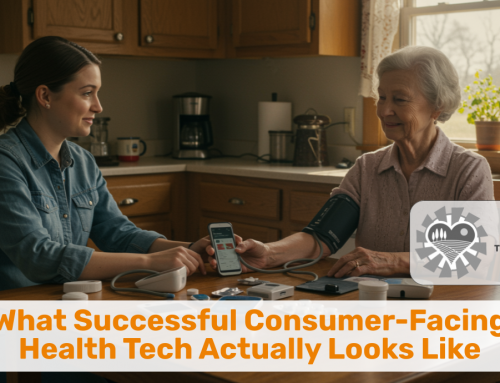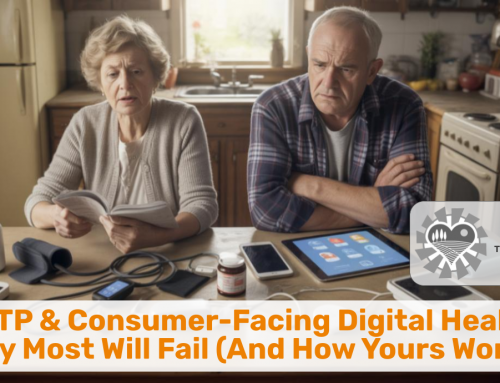No, Telehealth is not Rocket Science.
But getting clinicians to use telehealth well, is.
Let me explain…
As many readers of my weekly column know, there’s much more to telehealth than meets the eye.
On the one hand there are the various different modalities of telehealth such as video visits and remote physiological monitoring, as well as asynchronous secure messaging and virtual exams. Telehealth is not just about Zoom calls and phone calls.
On the other hand, telehealth is not about the technology. Rather, telehealth (after all, a clinical service) is about the “7 Thworfs” (telehealth workflows), the 6 key policies, and — most importantly — clinician engagement.
But enough of this “link dropping”…let’s dig in.
The Healthcare Delivery Innovation Conundrum
Most health systems, health centers, hospitals, and clinics are pretty good at running things, since otherwise they’d be out of business.
Some of the better (and larger) organizations are also embracing a culture of continual improvement (most often colloquially referred to as “continuous” improvement). At least there are commonly a few individuals that have a job title such as improvement specialist. And some of those, though not all, are great at continually improving things (as my colleague Kathy Letendre frequently writes about).
But being good at running things and maybe even making those things run better does not cut it in this world of volatility, uncertainty, complexity, and ambiguity (VUCA).
As an active practitioner of the mindset that “Every system is perfectly designed to get the results it gets”, I always look for the root causes. Why are our traditional healthcare delivery organizations so bad at embracing change, at adopting innovation? What system are they operating in that presumably does not reward change or innovation?
For starters, the consequences of failure are not trivial. A hotel chain, rideshare service, or amusement park can experiment with new service delivery models — and in the worst case scenario lose a few customers or get bad reviews for a short period of time.
In healthcare, the consequences of care delivered badly go beyond patient dissatisfaction. There are the risks of a misdiagnosis and missed diagnoses. Innovation gone wrong cannot simply be shrugged off with “Oh well, that did not work…” (I’m sure there’s a Far Side cartoon about that).
Thus the professions’ engrained attitude seems to be that the delivery of care is best not meddled with. Even innovative treatments, presented in the form of research evidence, take an average of 17 years to reach clinical practice. Which from my pragmatic point of view is simply a generational change: clinicians exposed to new research early in their education and training take that knowledge with them into practice, contributing to the 50% saturation point that in some papers the 17 years mark refers to (I’m sure confirmation bias or the power of first impressions also has a lot to do with it).
So it’s no surprise that getting clinicians to change their way of delivering care (especially in primary care and to some extent in specialty care) is hard. Kind of like Rocket Science.



The Formula for Rocking Success
Fortunately, Rocket Scientists eventually did develop the necessary set of formulas describing how to accelerate something very heavy into outer space, to control its trajectory, and even bring it safely back to earth.
As an engineer by training and a “Telehealth Adoption Scientist”, I can reassure you that the formula for accelerating telehealth adoption (and providing care safely) is not as complex as those formulas used by rocket scientists.
The formula for Telehealth Adoption Success is actually quite simple:
Telehealth Adoption Success = D * (A + K + S + R)
Getting clinicians to embrace telehealth requires Desire (D), Awareness (A), Knowledge (K), Skill (S), and Reinforcement (R).
As is obvious from the formula, “Desire”, as a multiplicator, is critical. Zero desire, zero success. Without any desire, telehealth for that particular clinician will never be successful.
The sum in the parentheses, is a combination of awareness (“why/how is telehealth useful to my patients?”), knowledge (“how to I deliver great care via telehealth?”), skills (“where I can safely practice the use of the technology?”) and reinforcement (“where can I get support and accountability?”).
Note: The longtime readers of Telehealth Tuesday will recognize that I merely deconstructed the ADKAR® elements of change management (developed by the Prosci Institute), replacing the second “A” (for Ability) with an “S” for skill. It’s not as pronounceable (“ADKSR”), but worked better for the formula.
Leading Clinicians to Telehealth Success
When as an organization you are determined to sustainably integrate telehealth into your care delivery, then you must learn how to influence clinicians to embrace telehealth more and to do so willingly and to the satisfaction of patients and the clinicians.
The five questions to ask and strategies to develop are:
-
How do I raise the awareness among clinicians that telehealth is a valuable, needed, and desirable way to deliver care?
-
How do I provide the knowledge to clinicians so that they feel competent, confident, and comfortable delivering care this way?
-
How do I train clinicians on the necessary skills – from virtual exams to “webside manners”, from offering telehealth to patients to proper, billable documentation?
-
How do I provide support and reinforcement to avoid the tempting slide back into “old habits”?
And most importantly, #5: How do I create within the clinicians the desire of wanting to make telehealth as a care delivery option their viable alternative to in person care.
We’ll tackle proven tactics to address those 5 questions in next week’s article, “Guiding Clinicians to Use Telehealth Well”.
How are you addressing those 5 elements with your clinicians? Let me know.








To receive articles like these in your Inbox every week, you can subscribe to Christian’s Telehealth Tuesday Newsletter.
Christian Milaster and his team optimize Telehealth Services for health systems and physician practices. Christian is the Founder and President of Ingenium Digital Health Advisors where he and his expert consortium partner with healthcare leaders to enable the delivery of extraordinary care.
Contact Christian by phone or text at 657-464-3648, via email, or video chat.








